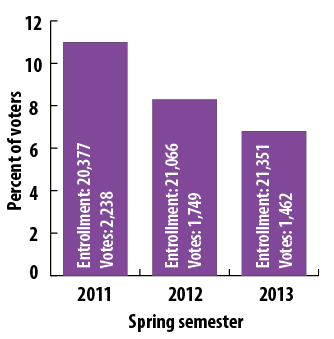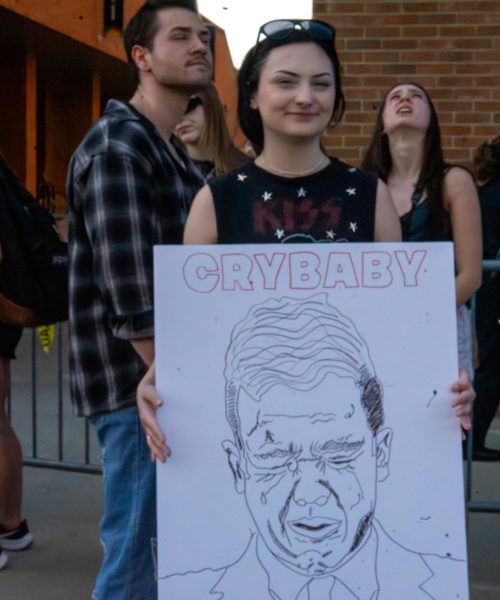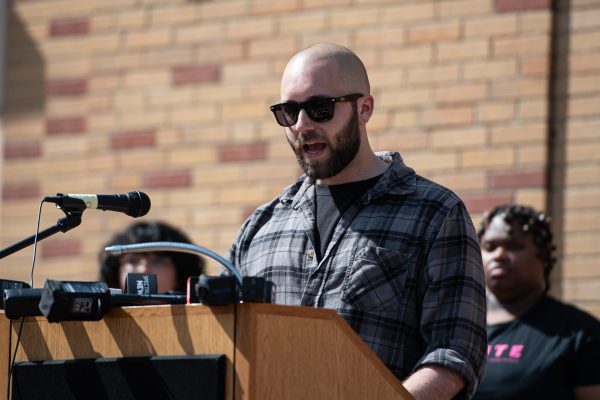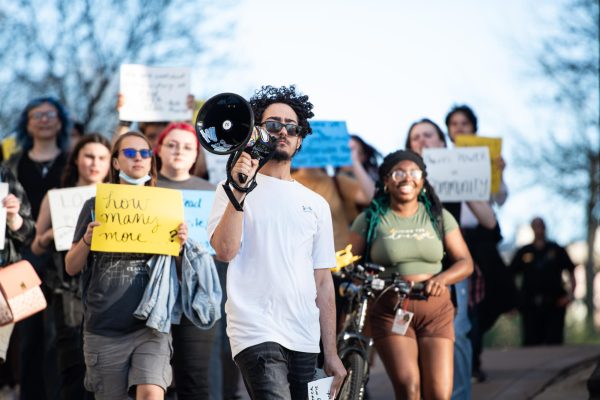USG election turnout declined despite some candidates’ campaigns

March 8, 2013
For the past two years, the election totals for the Undergraduate Student Government have been on a decline and Tuesday’s vote emphasized this trend.
According to the university’s website, Kent State’s main campus has 21,351 students enrolled, all of whom are eligible to vote. But of all eligible students, a mere 1,462 students voted in this year’s USG election, down from last year’s 1,749 votes and 2,238 votes in 2011.
“You hear that students will say ‘well I don’t know who USG is,’ but they are really able to find USG when it’s necessary and when it’s needed,” said Donna Carlton, faculty advisor to the USG. “Student government has been here since 1924 in all different forms, and it is the vehicle for students to reach out to the administration.”
Each student gets one vote for a student running for a director’s position and one vote for a senator in the college they are in. With numbers like 48 total votes coming from the College of Public Health and 53 votes coming from the College of Nursing, there is cause for concern in current executive director Evan Gildenblatt’s eyes.
“While I was pleased that students came out to vote, I was less than pleased with the turnout,” Gildenblatt said. “It decreased from last year, and that’s something that quite frankly, I wasn’t expecting nor am I too happy about.”
A decrease in voter turnout can be caused by a number of different reasons, but Carlton said that candidate’s campaigning plays one of the most important role’s in getting students excited to vote.
“It really depends on the candidates themselves, how much campaigning they all do,” Carlton said. “So if they’re into it and they’re out there to their constituents and driving up their votes, that, of course, will increase the amount of students who are voting because there is an interest there.”
One of those students who campaigned hard in one of the tightest election battles was director of governmental affairs elect Joe Bizjak. Through his month long campaign, Bizjak said he did a number of different things to get his name out to students.
“When I spoke to some voters, I asked them, ‘Hey, who did you vote for?’ and this was after the results and everything came out,” Bizjak said. “People said ‘Joe, a lot of people voted for you’ so I asked why is that, and people told me, ‘You got yourself out there more; you were physically more visible.’ And on top of that, they said that my posters were more appealing to the eye than my opponents’ [posters].”
Another thing that plays a big factor into elections is controversy. This is true in any election, that when voters have a pivotal decision to make with potentially two different outcomes, they are more likely to voice their opinion.
“Unfortunately it depends on how controversial the election is,” Carlton said. “So if you have people who are more into the trash and creating more of a scene, it creates more of an interest so people look and get more involved.”
Gildentblatt said he saw several different heated races this year with a lot on the line, but no candidate doing anything out of line, just close races.
“We had a number of interesting, contested elections, the candidates of which doing their own publicity and the USG doing our publicity,” Gildenblatt said. “All in the student media, on our website and on our social media pages, all over campus with paper signs.”
Contact Matt Lofgren at [email protected].























